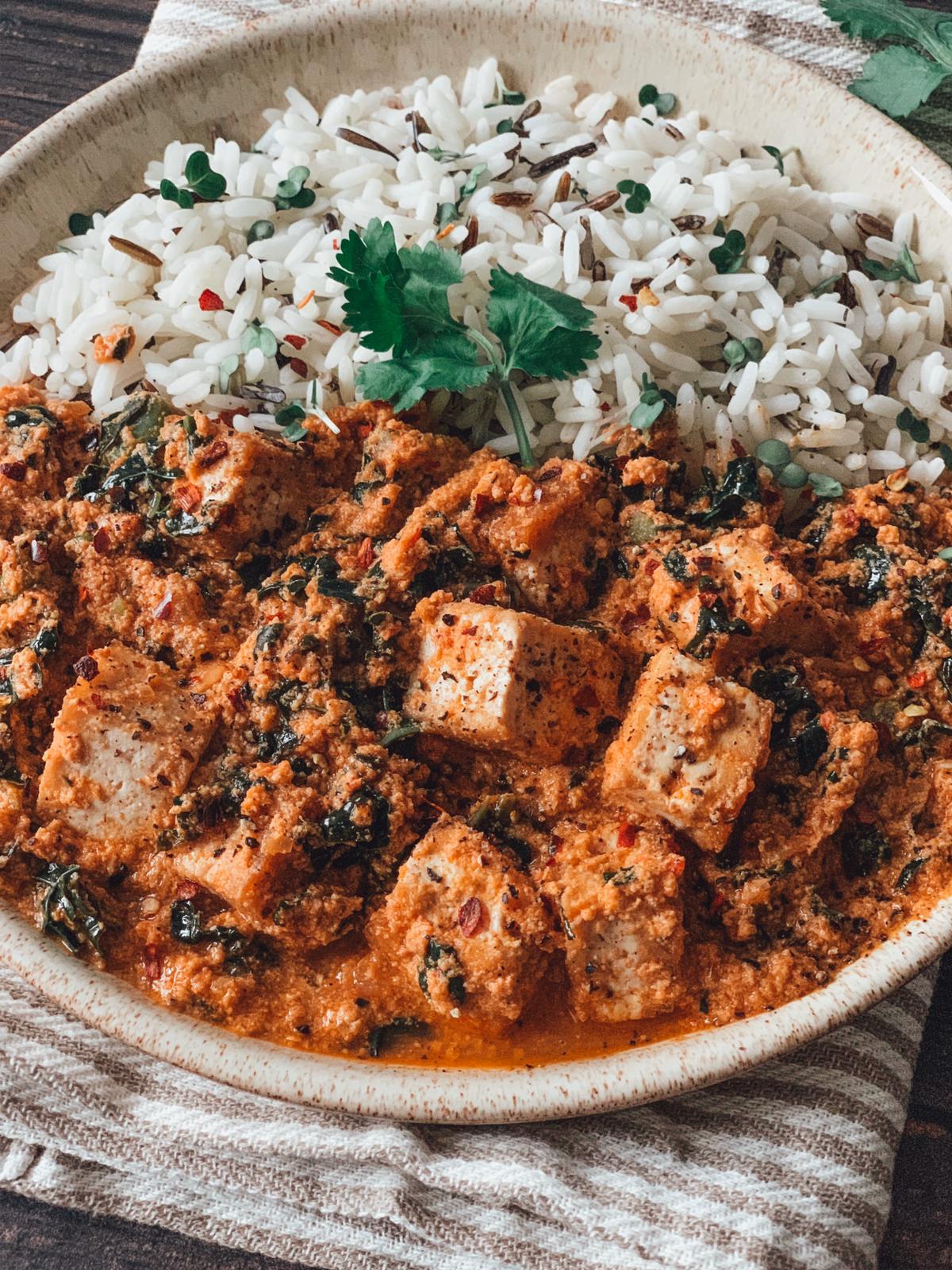
Introducing my Nigerian-inspired, protein-rich vegan egusi stew. Enjoy this with rice, yams, plantains, sweet or regular potatoes.
I rarely post African dishes on my Instagram page on my blog and that is something I’m working on changing. I used to find it difficult to get hold of authentic African ingredients, but now that I’ve found some trustworthy sources on Amazon (yes, Amazon), there’s no holding back.
African food is very diverse. In Nigeria alone, there are over 250 ethnic tribes. Each of those tribes has more than a few dishes unique to them, so you can begin to imagine how many potential recipes are available. We tend to eat mainly thick soups with doughs made from cassava (garri), yam or plantain in Nigeria. In my opinion, over 75% of the dishes in Nigeria are soup-based, but we also have various recipes with yams, plantains, beans and rice.
In today’s post, I will focus on Egusi soup or stew. This is one dish that is eaten across all of Nigeria, and even in Ghana and Cameroon. I suspect that most West African countries eat it, but their method of cooking varies.
I will provide more details about the health and nutritional benefits of Egusi in another post. It is worth noting for now that it is a good source of potassium, magnesium, calcium and iron (Gurudeeban, et al. 2010). Egusi also provides around 13g of protein, 46.7g of fibre and approximately 34g of fat per 100g, 80% of which are unsaturated fatty acids (Al-Snafi, 2016). As with any other plant food, it is naturally cholesterol-free, and it is known to have anti-diabetic, anti-cancer, anti-lipidemic and anti-microbial properties (Al-Snafi, 2016).
You can find Egusi in most African food stores, otherwise, do what I do and buy it off Amazon, lol!


Nigerian-inspired Vegan Egusi (Melon) Seed Stew with Tofu
- Prep Time: 10 mins
- Cook Time: 40 mins
- Total Time: 50 minutes
- Yield: Serves 4
- Category: Lunch/Dinner
- Cuisine: Nigerian-inspired
Description
Nigerian-inspired, protein-rich vegan egusi stew. Enjoy this with rice, yams, plantains, sweet or regular potatoes.
Ingredients
- 400g tin plum tomatoes
- 1 large red onion, peeled and quartered
- 3 medium garlic cloves
- 1 large red bell pepper
- 1 large red chilli
- ½ inch ginger
- 4 tablespoons ground egusi (melon seeds)
- 1 pack tofu, drained and cubed
- 2 vegetable stock cubes
- 2 tablespoons olive oil
- 100g chopped kale or spinach
Instructions
Preheat the oven to 200C. Line a baking tray with baking paper then evenly distribute tofu on the tray and bake for 25 minutes, turning halfway through cooking until all sides are golden then set aside and keep warm.
Put the tomatoes, red onion, garlic cloves, bell pepper, ginger and chilli in a food processor and blitz to form a smooth liquid. Tip the mixture into a medium saucepan and cook on a medium heat for 25 minutes until the sauce reduces to a very thick paste.
Heat the olive oil in another saucepan over medium heat. Once hot, add the ground egusi and fry, stirring frequently for 4 minutes. Stir in the tomato paste, fry for an additional two minutes then add around 200ml of water. Add the vegetable stock cube and adjust seasoning as needed with salt pepper. Allow to cook on medium heat for 3 minutes then add kale and tofu. Cook for 4-5 minutes or until the kale is tender then serve over rice.
References
- Gurudeeban, S. et al. (2010) Bitter Apple (Citrullus colocynthis): An Overview of Chemical Composition and Biomedical Potentials. Asian Journal of Plant Sciences 9(7): 394-401.
- Al-Snafi E (2016) Chemical Constituents and pharmacological effects of Citrullus colocynthis – A review. IOSR Journal of Pharmacy 6(3): 57-57

